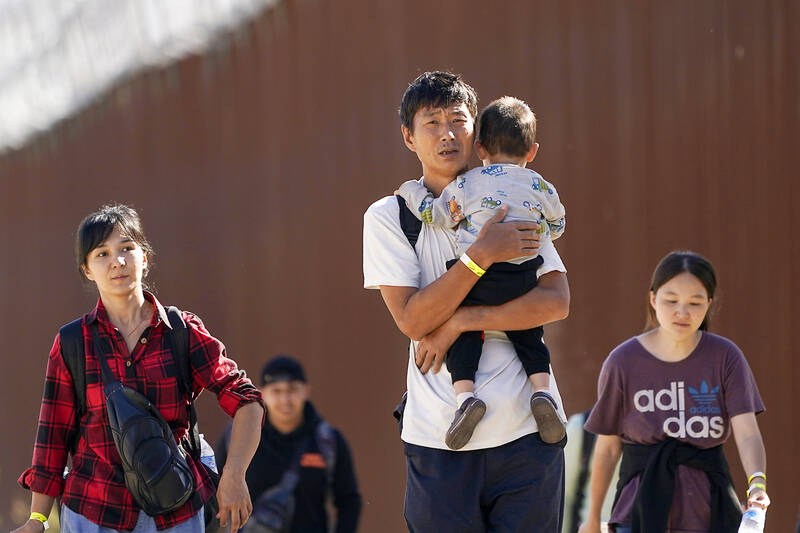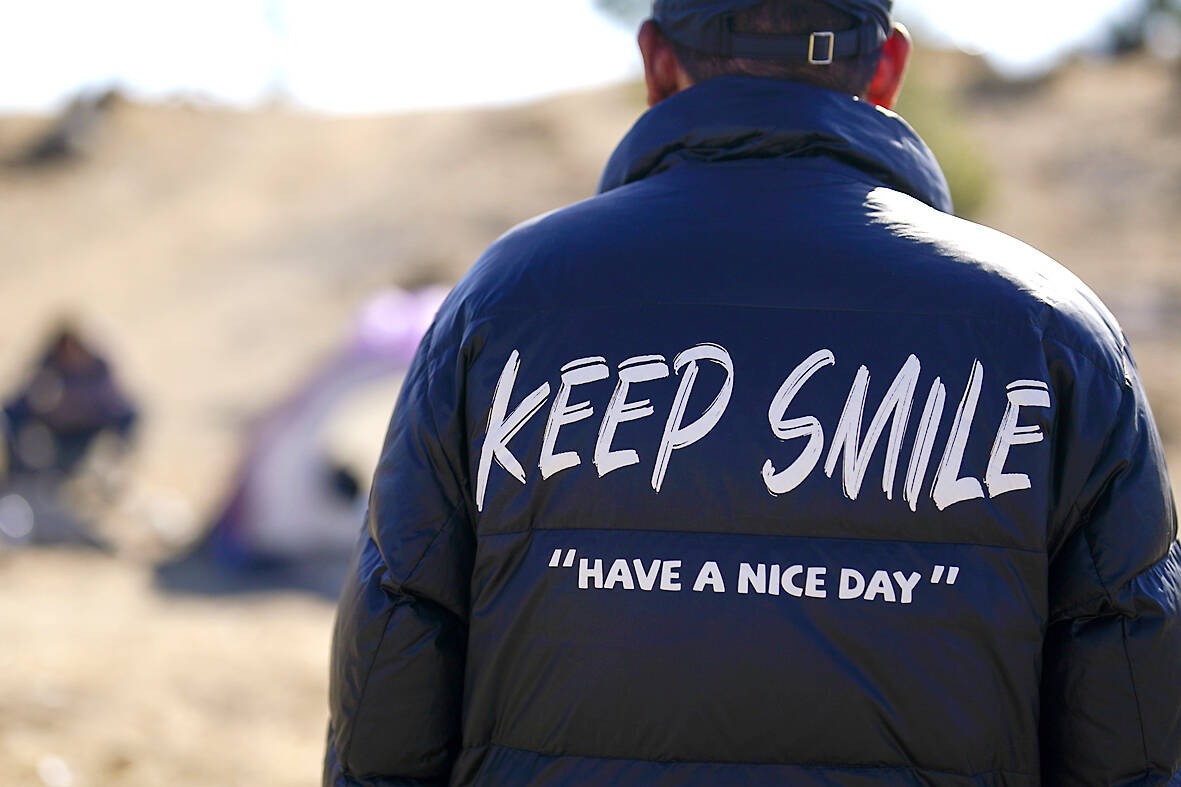The young Chinese man looked lost and exhausted when Border Patrol agents left him at a transit station. Deng Guangsen, 28, had spent the last two months traveling to San Diego from the southern Chinese province of Guangdong, through seven countries on plane, bus and foot, including traversing Panama’s dangerous Darien Gap jungle.
“I feel nothing,” Deng said in the San Diego parking lot, insisting on using the broken English he learned from Harry Potter movies. “I have no brother, no sister. I have nobody.”
Deng is part of a major influx of Chinese migration to the US on a relatively new and perilous route that has become increasingly popular with the help of social media. Chinese people were the fourth-highest nationality, after Venezuelans, Ecuadorians and Haitians, crossing the Darien Gap during the first nine months of this year, according to Panamanian immigration authorities.

Photo: AP
Chinese asylum-seekers, as well as observers, say they are seeking to escape an increasingly repressive political climate and bleak economic prospects.
They also reflect a broader presence of migrants at the US-Mexico border — Asians, South Americans and Africans — who made September the second-highest month of illegal crossings and the US government’s 2023 budget year the second-highest on record.
The pandemic and China’s COVID-19 policies, which included tight border controls, temporarily stemmed the exodus that rose dramatically in 2018 when President Xi Jinping (習近平) amended the constitution to scrap the presidential term limit. Now emigration has resumed, with China’s economy struggling to rebound and youth unemployment high. The UN has projected China will lose 310,000 people through emigration this year, compared with 120,000 in 2012.

Photo: AP
RUNNING AWAY
It has become known as runxue (潤學), or the study of running away. The term started as a way to get around censorship, using a Chinese character whose pronunciation spells like the English word “run” but means “moistening.” Now it’s an Internet meme.
“This wave of emigration reflects despair toward China,” Cai Xia, editor-in-chief of the online commentary site of Yibao and a former professor at the Central Party School of the Chinese Communist Party in Beijing.

Photo: AP
“They’ve lost hope for the future of the country,” said Cai, who now lives in the US. “You see among them the educated and the uneducated, white-collar workers, as well as small business owners, and those from well-off families.”
Those who can’t get a visa are finding other ways to flee the world’s most populous nation. Many are showing up at the US-Mexico border to seek asylum. The Border Patrol made 22,187 arrests of Chinese for crossing the border illegally from Mexico from January through September, nearly 13 times the same period last year.
Arrests of Chinese people peaked at 4,010 in September, up 70 percent from August to become the ninth-highest nationality at the US border and the highest outside of Mexico, Central and South America. The vast majority were single adults.
The popular route to the US is through Ecuador, which has no visa requirements for Chinese nationals. Migrants from China join Latin Americans there to trek north through the once-impenetrable Darien and across several Central American countries before reaching the US border. The journey is well-known enough it has its own name in Chinese: walk the line, or zouxian (走線).
The monthly number of Chinese migrants crossing the Darien has been rising gradually, from 913 in January to 2,588 in September. For the first nine months of this year, Panamanian immigration authorities registered 15,567 Chinese citizens crossing the Darien. By comparison, 2,005 Chinese people trekked through the rainforest last year, and just 376 in total from 2010 to 2021.
GUIDES
Short video platforms and messaging apps provide not only on-the-ground video clips but also step-by-step guides from China to the US, including tips on what to pack, where to find guides, how to survive the jungle, which hotels to stay at, how much to bribe police in different countries and what to do when encountering US immigration officers.
Translation apps allow migrants to navigate through Central America on their own, even if they don’t speak Spanish or English. The journey can cost thousands to tens of thousands of dollars, paid for with family savings or even online loans.
It’s markedly different from the days when Chinese nationals paid smugglers, known as snakeheads, and traveled in groups.
With more financial resources, Xi Yan, 46, and her daughter Song Siming, 24, didn’t trek the Ecuador-Mexico route, but instead flew into Mexico via Europe. With help from a local guide, the two women crossed the border at Mexicali into the US in April.
“The unemployment rate is very high. People cannot find work,” said Xi Yan, a Chinese writer. “For small business owners, they cannot sustain their businesses.”
Xi Yan said she decided to leave China in March, when she traveled to the southern city of Foshan to see her mother but had to leave the next day when state security agents and police officers harassed her brother and told him that his sister was not allowed in the city. She realized she was still on the state blacklist, six years after being detained for gathering at a seaside spot to remember Liu Xiaobo (劉曉波), a Nobel peace laureate who died in a Chinese prison. In 2015, she was locked up for 25 days over an online post remembering the victims of the 1989 Tiananmen Massacre.
Her daughter, Song, agreed to leave with her. A college graduate, the daughter struggled to find work in China and became depressed, the mother said.
Despite the challenges to survive in the US, Xi Yan said it was worth it.
“We have freedom,” she said. “I used to get nervous whenever there was a police car. Now, I don’t have to worry about it anymore.”

There is a Chinese Communist Party (CCP) plot to put millions at the mercy of the CCP using just released AI technology. This isn’t being overly dramatic. The speed at which AI is improving is exponential as AI improves itself, and we are unprepared for this because we have never experienced anything like this before. For example, a few months ago music videos made on home computers began appearing with AI-generated people and scenes in them that were pretty impressive, but the people would sprout extra arms and fingers, food would inexplicably fly off plates into mouths and text on

From censoring “poisonous books” to banning “poisonous languages,” the Chinese Nationalist Party (KMT) tried hard to stamp out anything that might conflict with its agenda during its almost 40 years of martial law. To mark 228 Peace Memorial Day, which commemorates the anti-government uprising in 1947, which was violently suppressed, I visited two exhibitions detailing censorship in Taiwan: “Silenced Pages” (禁書時代) at the National 228 Memorial Museum and “Mandarin Monopoly?!” (請說國語) at the National Human Rights Museum. In both cases, the authorities framed their targets as “evils that would threaten social mores, national stability and their anti-communist cause, justifying their actions

On the final approach to Lanshan Workstation (嵐山工作站), logging trains crossed one last gully over a dramatic double bridge, taking the left line to enter the locomotive shed or the right line to continue straight through, heading deeper into the Central Mountains. Today, hikers have to scramble down a steep slope into this gully and pass underneath the rails, still hanging eerily in the air even after the bridge’s supports collapsed long ago. It is the final — but not the most dangerous — challenge of a tough two-day hike in. Back when logging was still underway, it was a quick,

US President Donald Trump’s threat of tariffs on semiconductor chips has complicated Taiwan’s bid to remain a global powerhouse in the critical sector and stay onside with key backer Washington, analysts said. Since taking office last month, Trump has warned of sweeping tariffs against some of his country’s biggest trade partners to push companies to shift manufacturing to the US and reduce its huge trade deficit. The latest levies announced last week include a 25 percent, or higher, tax on imported chips, which are used in everything from smartphones to missiles. Taiwan produces more than half of the world’s chips and nearly all